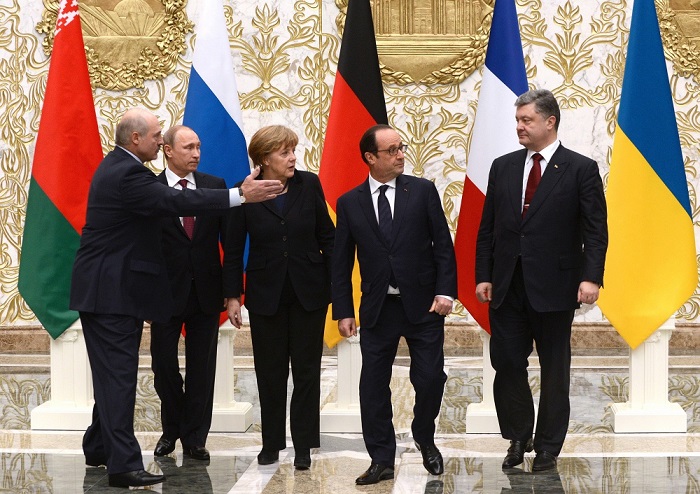
Why Sanctions Against Belarus Could Not Stand
Publication: Eurasia Daily Monitor Volume: 13 Issue: 37
By:

The removal of the sanctions on Belarus by the European Union continues to be one of the most debated topics in the Belarusian media. The most meaningful piece about sanctions, however, has arguably shown up not in Belarus but in the Russian daily Izvestia (Izvestia, February 16). The article was written by a Minsk-born-and-raised ethnic Belarusian Kirill Koktysh, an associate professor at the Moscow State Institute for International Relations, the alma mater of most Russian diplomats. Koktysh refers to the following four reasons behind the lifting of the sanctions:
First, the decision was motivated by the situation in and around Ukraine. Telling everybody that the Belarusian political regime is authoritarian, even dictatorial, whereas the Ukrainian one is democratic defied common sense, Koktysh believes. In fact, compared with other authoritarian regimes, the Belarusian one comes across to most Eastern Europeans as rather mild or, as Koktysh puts it, “vegetarian.” In Belarus itself, the popularity of a pro-European orientation for the country has declined to an all-time low (see EDM, January 22). Ironically, Belarusian President Alyaksandr Lukashenka is much more popular in Ukraine than its own head of state.
Second, by all accounts, it has eventually dawned upon Eurocrats that their attempt to isolate Belarus led to a result directly opposite to what they expected, Koktysh argues. Specifically, sanctions helped consolidate and strengthen the nationally oriented elite. The sheer impossibility of holding savings abroad and the ensuing necessity to secure money at home nudged Belarusian officials to take special care of all aspects of the national living space. The third factor was Minsk’s proactive offer to provide the crucial venue for the Ukrainian-Russian ceasefire talks. A bizarre situation arose whereby German Chancellor Angela Merkel, French President François Hollande, and then–European High Representative Catherine Ashton all went to Minsk and shook hands with Lukashenka, whereas the official stand of the EU was still to shun him as a dictator. The fourth factor was the ignominious failure of the EU’s Eastern Partnership, something that Witold Waszczykowski, the new Polish foreign minister, pulled no punches about, during his first address before the parliament (Msz.gov.pl, January 29).
Koktysh believes that due to the cancelation of sanctions, Minsk may now begin to extract two new kinds of benefits. First, are economic benefits. Due to sanctions imposed on Russia, many European companies had to abandon the Russian market only to see their niche being captured by the Chinese. While Russia’s trade exchange with the EU has shrunk from €450 million ($494 million) to €235 million ($258 million), many European producers, especially the Germans, are now considering transferring their production capacities to Belarus. And because Belarus is a member of the Eurasian Economic Union, Russia’s market would still be available to those who would relocate. That way, Belarus may make up for the losses resulting from a steep decline in oil prices and the devaluation of the Belarusian ruble. Incidentally, judging by the recent interview of Belarus’s Foreign Minister Vladimir Makei to the Belarusian TV channel STV (Mfa.gov.by, February 13), it is highly likely that precisely such issues of relocation were vigorously discussed during at least some of the twenty meetings that Makei took part in while visiting Germany (February 12–14). Also, on February 24, a relatively high-level EU delegation will pay a visit to Minsk. Judging by the fact that László Baranyay, the new Vice President of the European Investment Bank, and the associates of the Directorate General for Economic and Financial Affairs are going to be among the members of that delegation, the EU is clearly committed to providing support for Belarus, which is in urgent need of financial aid.
The second benefit, according to Koktysh, may have to do with extending and elevating the Minsk venue for the Ukrainian peace talks into a project that would replace the hapless and defunct Eastern Partnership. This time, however, the arrangement would not seek to isolate Russia. But if so, Minsk’s growing regional ambitions as a donor of stability can only be realized if a high level of trust is maintained between Moscow and Minsk.
Judging by Russian and Belarusian media, however, this is not preordained. A recent extensive article in Lenta.ru, a usually moderate (on a Russian scale) news portal, ascribes only mercenary motives to Minsk and indirectly rebukes the Belarusian leader by claiming that “Austrians [who incidentally have just opened their embassy in Minsk], Czechs, Poles and Swedes have never entertained any illusions regarding the personality of Lukashenka” (Lenta.ru, February 20). At the same time, the Belarusian pro-government commentator Mikhail Malash suggests that the resource of ordinary Russians’ goodwill toward Belarus is not unlimited. Malash bemoans the fact that the Belarusian government does not rebuff the growing anti-Belarusian and anti-Lukashenka campaign in the Russian media and warns that passivity in this area could lead to a loss of independence (Imhoclub.by, February 10).
Predictions of further tightening of relations between Belarus and the West are largely non-existent either. Thus, writing for Soyuznoe Veche, the mouthpiece of the Union State of Russia and Belarus, Viacheslav Soutyrin ascribes traditional sinister motives to the West, especially to the United States, reportedly for trying to “advance the doctrine of military-political neutrality of Belarus from Russia” (reprint by Belarus Segodnya, February 19). This is a curious choice of words considering that neutrality is, by definition, in regard to all sides, not “from” one of them. In his turn, Koktysh suggests that a truly close relationship between Minsk and Brussels is now unlikely not because Brussels does not have the readiness or money to establish and maintain it, but because the Belarusian political regime has a history of reflecting and expressing popular attitudes and aspirations. And the latter are just not Europe-friendly at the moment. In particular, the Belarusian public has witnessed the tremendous economic losses that neighboring Ukraine has suffered from its war against Russia and its proxies in the east, which notably began after Ukrainians adamantly declared their pro-European leaning in street protests. But conspicuously, the EU has taken no steps to properly compensate Ukraine for these losses, nor do European officials make any pretense to think along such lines (Izvestia, February 16).
In summary, while the lifting of sanctions by the EU has manifested an overdue change in the Western policy vis-à-vis Belarus, it effectively posed more questions than it addressed.




